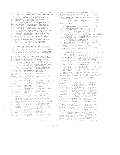 Brain', that the Instrumentality takes on the added and - as it turns out - misguided mission of creating a utopia. This utopia, like all utopias, is intended to banish suffering and unhappiness - and succeeds instead in removing all meaning from life.
Brain', that the Instrumentality takes on the added and - as it turns out - misguided mission of creating a utopia. This utopia, like all utopias, is intended to banish suffering and unhappiness - and succeeds instead in removing all meaning from life.
It is never made entirely clear why the Instrumentality sets out upon this course -hardly any of Dr. Linebarger's stories take place during the period when the false utopia is being established, and none deal directly with the issue. But it is clear that Dr. Linebarger conceived of this type of bland society as the inevitable end product of the secular humanist ethical system - a system he saw as ignoring the human needs for freedom and variety in favour of emphasis on sensual pleasures and creature comforts, as substituting security and guaranteed happiness in place of liberty and the pursuit of happiness.
But while the decadence of the Instrumentality's utopia was the expression of a secular humanist ideology, Dr. Linebarger also seems to have seen it as an almost inevitable danger created by the dynamics or social evolution.
"Vitality" is a word that occurs so often in the stories of the Instrumentality that its presence cannot be an accident. In OLD NORTH AUSTRIALIA we learn that new members are recruited into the Instrumentality on the basis of their "intelligence, will, vitality, and again, vitality." Rod McBanI in the same novel, contrasts the different sorts of vitality represented by his home planet and Earth. Carlotta vomAcht is praised by Laird in 'Mark Elf' for bringing the "gift of vitality" back to mankind. And Lord Sto Odin, in 'Under Old Earth' worries that mankind is "failing in vitality, strength, numbers, energy" because of the enervating influence of Utopia.
Dr. Linebarger saw this vitality as the essential life force, or evolutionary drive, in humanity. He could hardly have made it any more clear than in 'Three to a Given Star', wherein Folly reflects, "If we hadn't been vital and greedy and lustful and yearning, if we hadn't had big thoughts and wanted bigger ones, we would have stayed animals. like all the little things back on Earth.
The value placed on vitality by the Instrumentality is shown in 'Scanners Live in Vain', wherein - despite their attempted treason - the Scanners are made deputy chiefs for space instead of being punished. Explains Adam Stone, "You don't think the Instrumentality would waste the Scanners, do you9"
Dr. Linebarger realized that willfulness could sometimes go wrong and result in evil - but considered this far preferable to decadence. In OLD NORTH AUSTRALIA, the E'telekeli even suggests that evil has a frightful place in human affairs - surely an odd viewpoint for the patriarch of the Old Strong Religion.
It is the strain of vitality in mankind
that advances evolution in the Cordwainer Smith epic by introducing conflict and competition between man and his physical environment and man and man. Yet over the long run, this conflict seems to wear down vitality. Differences tend to be settled, cultures tend to merge, the unfit t~ to overwhelm the fit.
Dr. Linebarger, as a social scientist, was keenly interested in the ecology of society - his best created worlds, such as Viola Siderea, Henriada, and Old North Australia itself, take an ecological approach. Beyond this, he seems to have had a conception of social entropy - of societies being worn down to their lowest common denominator as their conflicts are worn down. There is a hint of a thermodynamic theory of society in 'The Dead Lady of Clown Town', when the Lady Goroke decides to order "police fever, one degree" on Fomalhaut III. And a reference to "post-Riesmannian societies" in the same story reveals his interest in social evolution.
It seems clear that Dr. Linebarger believed the tendency towards social entropy to be one of the key problems in the evolution of human society. He has the E'telekeli make this point explicitly in OLD NORTH AUSTRALIA -human societies, he tells Rod McBan, "reach a point of development and then they stop."
The context of the statement, that men always feel "haunted by themselves," suggests Dr. Linebarger saw a psychological factor in social entropy; that fear of death and fear of the unknown tend to create the desire for a utopia in which men may escape risk and uncertainty. Thus human psychology, ideology and the wearing down of cultural conflicts all combine to lead human evolution in the direction of maximum social and cultural entropy.
Some force is needed, Dr. Linebarger
seems to tell us, to renew the spiritual energies of humanity from time to time. During the Dark Age, which is Just as static if not based on the Pleasure Revolution this renewal is represented by the advent of the Vomact family, and (by implication) the eventual reintegration of the Unforgiven into human society. The Vomacts and the Unforgiven bring vitality back to mankind after one crisis. In the later and greater spiritual crisis, religion becomes the means of restoring vitality and combating entropy.
In 'Under Old Earth, the Lord Sto Odin
is astounded to learn his robot Livius knows what a god is : "a person or an idea capable of starting wholly new cultural patterns in motion."
It is perhaps just as astounding that
Dr. Linebarger, the devout Episcopalian, would take such a detached viewpoint towards religion in one of his most important stories. Yet it is characteristic of one side of the ambivalent attitude about religion
- 19 -
Document scaning and conversion provided by Peter Barker
Updated May 12, 2015. If you have a comment about these web pages please send a note to the Fanac Webmaster. Thank you.